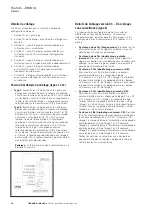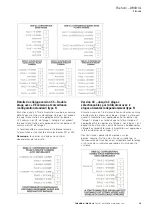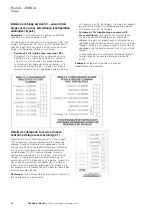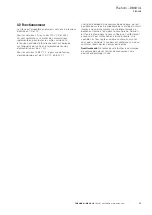
2
The horn – DB3B UL
TM261 April 2020 www.eaton.com
The horn – DB3B UL
English
Wiring details
The unit is available in a number of basic configurations:
1. AC input, single stage.
2. AC input, dual stage with voltage-free stage selection.
3. DC input, up to 3 user selectable stages without
monitoring.
4. DC input, up to 2 user selectable stages with
EOL/monitoring (standard configuration).
5. DC input, up to 3 user selectable stages with 2
independantly powered stages.
6. DC input, up to 3 user selectable stages with optional
EOL/monitoring (alternative configuration).
7. DC input, 5 user selectable stages with voltage free
stage selection with or without monitoring.
AC version wiring details (Types 1 & 2)
• Type 1:
Connect the live and neutral supply wires to
the terminals as detailed in the wiring diagram. The
unit will be supplied with the link between R1 and R0
fitted to the terminals. When power is applied to the
unit, the stage 1 tone will be produced as selected
on the 5- way DIP switch.
• Type 2:
Connect the live and Neutral supply wires
to the terminals as detailed in the wiring diagram.
The unit will be supplied with no link fitted between
R1 and R0. Connect wires and remote switches to
terminals R0, R1 and R2 as shown. When power is
initially applied to the unit, no tone will be produced.
When the switch connected to R1 is closed, the
stage 1 tone will be produced as selected by the
5-way DIP switch on the electronics assembly.
When the switch connected to R2 is closed, the
pre-selected tone for stage 2 is produced. See tone
table 2 for details of pre-selected tones.
ote:
N
Closing both switches will produce no tone.
DC version – 3 stage without monitoring wiring
details (Type 3)
This type can be configured in a number of different ways
depending on requirements. Independent tone selection
for all 3 stages is via the 3 off 5-way DIP switches fitted
to the electronics assembly:
• 2-wire system (Single stage):
Connect the positive
and negative supply wires to the terminals as detailed
in the wiring diagram.
• 2-wire system (Dual stage, reverse polarity):
Connect the positive and negative supply wires to
the terminals as detailed in the wiring diagram. The
second stage is produced by reversing the polarity of
the supply to the unit.
• 3-wire system (Dual stage, ve):
Connect
3 supply wires to the terminals as detailed in the
wiring diagram (1 ve wire and 2 -ve wires).
Stage 1 is produced when power is applied across the
ve and stage 1 -ve terminals. Stage 2 is
produced when power is applied across the common
+ve and stage 2 -ve terminals.
• 3-wire system (Dual stage, common -ve):
Connect
3 supply wires to the terminals as detailed in the
wiring diagram (2 +ve wires and 1 common -ve wire).
Stage 1 is produced when power is applied across
the stage 1 +ve and common -ve terminals. Stage 2
is produced when power is applied across the stage 2
+ve and stage common -ve terminals.
• 4-wire system (Triple stage, Common -ve):
Connect
4 supply wires to the terminals as detailed in the
wiring diagram (3 +ve wires and 1 common -ve wire).
Stage 1 is produced when power is applied across
the stage 1 +ve and common -ve terminals. Stage 2
is produced when power is applied across the stage 2
+ve and common -ve terminals. Stage 3 is produced
when power is applied across the stage 3 +ve and
common -ve terminals.
All versions are supplied with terminals to allow
loop-in loop-out connection of the supply wires.































